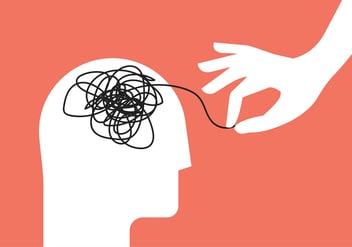Mental health is a big deal, especially considering 1 in 5 Americans struggle with mental illness every year.1 Yet less than half of those who do struggle actually reach out for help.2
There could be many reasons for this. Maybe they're scared about the stigma or what others will think. Maybe they don’t think they need help. Or maybe they don’t know how to reach out or where to go. Even though it can be scary to reach out when you are suffering, we want you to know that there is absolutely nothing wrong with doing so.
In fact, it could be the very thing that saves your life!
If you’re struggling to know where to go or how to reach out, here are 3 resources below to help you. Think of it as sort of like a first-aid kit for your mind. We also highly recommend you open up about your struggles with someone you can trust in your life. That way you don’t have to go through any mental health struggles alone and can have someone to help you get the help you need and deserve.
**If this is an emergency, please dial 911 or 988.**
1. MentalHealth.gov
MentalHealth.gov provides a ton of useful information for people struggling with mental health as well as friends and family of those suffering. You can easily find information such as what to look for in various mental illnesses, resources for talking about it, and ways to get help. Use this site to inform yourself, find help for yourself and others, and more.
To note: this site is for mental health overall, there are additional resources for specific issues such as eating disorders, anxiety, and depression (to name a few).
2. Psychology Today
When you are struggling, talking to someone can be a huge help! If you’re looking for a licensed professional, Psychology Today can make it easy to find the help you’re looking for. Once you enter your city or zip code, you’ll see a list of professionals in your area. You can also filter by factors such as price, insurance, area of speciality, and more.
To note: if therapy is not something you're able to afford or you don’t want that level of help, we can always help connect you with someone to talk to for free.
3. National Institute of Mental Health
Last but not least, NIMH is a great site for all things mental health. Dive into a variety of mental disorders and related topics, treatment options, help resources, and more. NIMH is also great for finding statistics, facts, and research about mental health to better inform yourself (and others) and hopefully feel less alone.
What to Look for in a Resource
We really hope one or more of these resources can provide you with the help you’re looking for and deserve. But if not, reaching out to a school counselor, primary care doctor, friend or family member can also assist you. No matter who you talk to or where you go for help, here are a few things to look for:
Caring and compassionate
Your struggles are real and valid. Make sure the person or place you’re getting help from believes that and shows you it’s true.
Trustworthy
You don’t have to have known someone for a long time to trust them, but you do need to feel comfortable and safe opening up to them. Find someone who feels like a safe space so you can be honest and open up about what you’re going through.
Listens and understands you
Everyone is unique and different. If someone doesn’t take the time to listen to what you have to say, ask questions, or try to understand your unique experience, they probably aren’t going to be much help.
Knowledgeable
Like with any help for your health, you want the person, place, or resource you reach out to to use who and what they know to help you with your struggles.
As a reminder, it’s okay to not be okay. We all struggle at different points in our lives. But that doesn’t mean you have to handle it all on your own. Reaching out for help is crucial to improving your mental health. If doing so seems overwhelming, just start by taking one step forward. Read one article, reach out to one person, send one message. You are worth getting help!
----------
2: National Institute of Mental Health (https://www.nimh.nih.gov/health/statistics/mental-illness)



